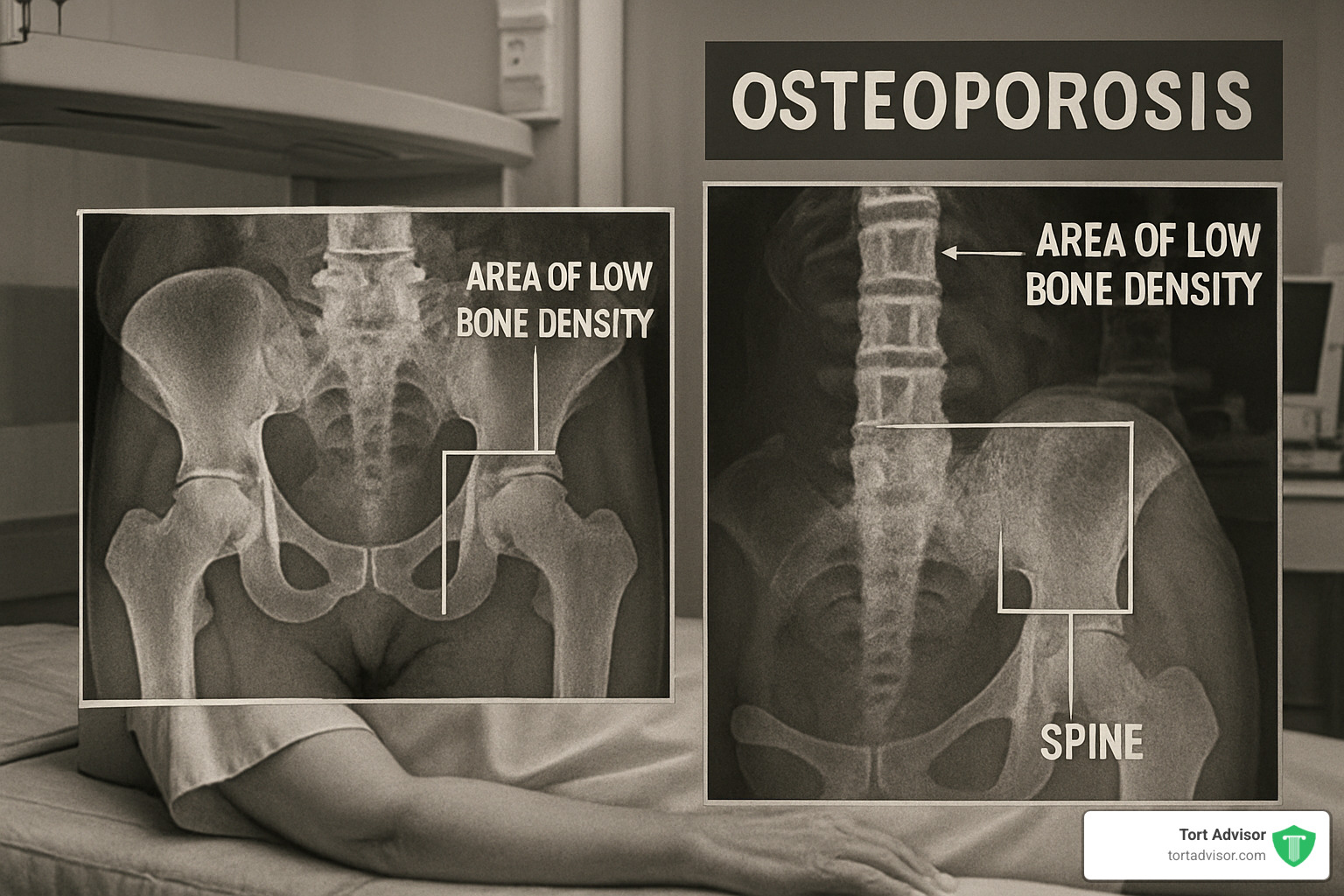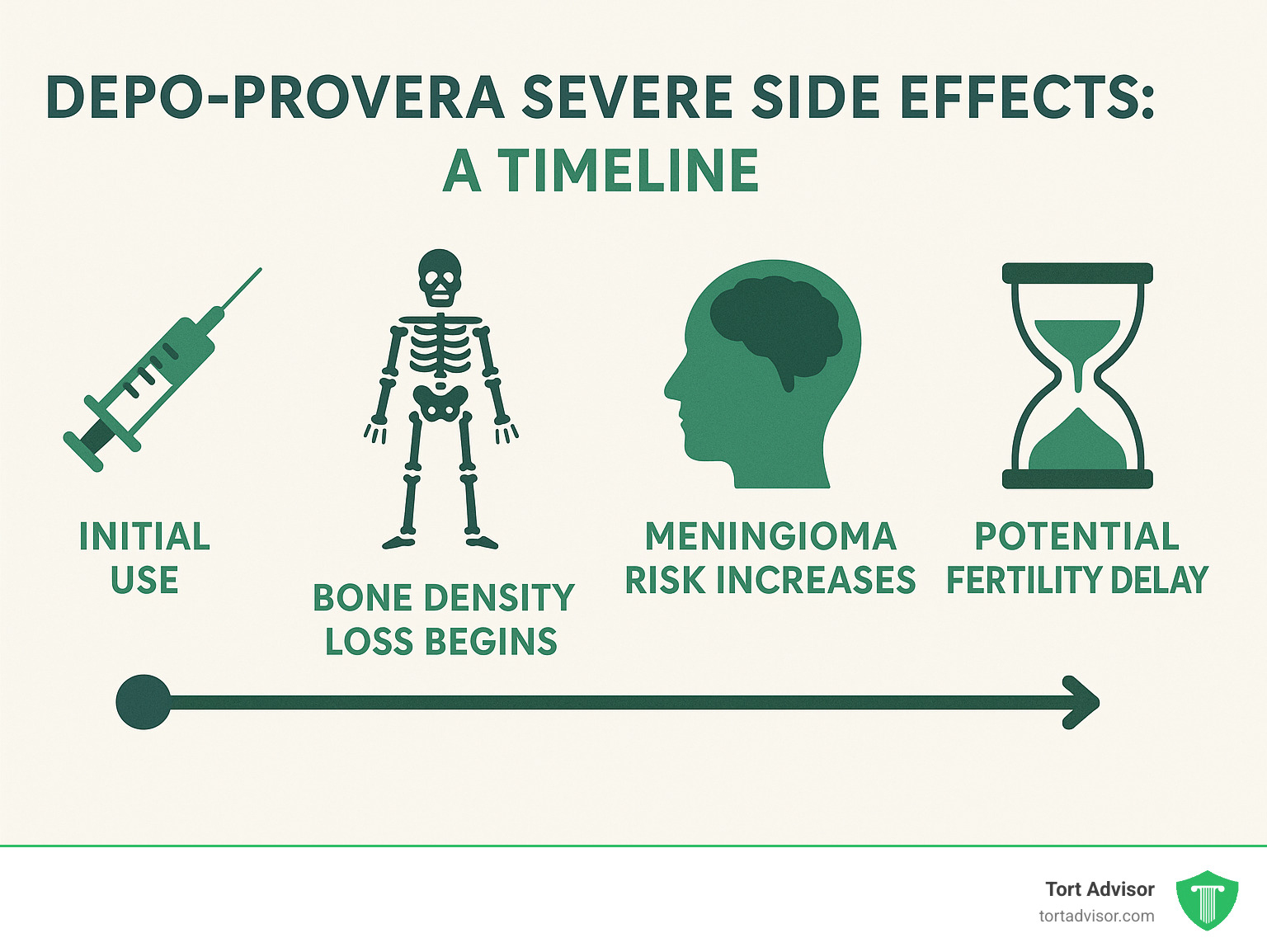


Understanding the Hidden Dangers of Birth Control Injections
Depo Provera severe side effects can have life-altering consequences for women using this popular contraceptive injection. If you’re searching for information about these risks, here’s what you need to know:
| Severe Side Effect | Description | Warning Signs |
|---|---|---|
| Bone Density Loss | FDA black box warning; may be irreversible | Fractures, height loss |
| Brain Tumors (Meningiomas) | 5.6× increased risk with long-term use | Severe headaches, vision changes, seizures |
| Blood Clots | Nearly 4× higher risk of deep vein thrombosis | Leg pain/swelling, chest pain, shortness of breath |
| Stroke/Heart Attack | Increased risk, especially in smokers | Sudden weakness, speech problems, chest pain |
| Liver Damage | Rare but serious hepatic injury | Jaundice, abdominal pain, dark urine |
While Depo-Provera offers a convenient, highly effective birth control option that lasts three months per injection, many women aren’t fully informed about its potential serious risks. The FDA recommends limiting use to two years maximum due to concerns about bone health, yet many patients continue treatment longer without understanding the consequences.
Recent studies have revealed alarming connections between prolonged Depo-Provera use and severe health problems. Most notably, a March 2024 study published in the British Medical Journal found that using Depo-Provera for over a year increased the risk of meningiomas by more than five times compared to other contraceptive methods.
How Depo-Provera Works & Common Reactions
Depo-Provera is quite the multitasker in your body. This progestin-only contraceptive contains medroxyprogesterone acetate—essentially a lab-created version of your natural progesterone hormone that works overtime to prevent pregnancy.
When injected, it immediately gets to work by preventing ovulation (no egg = no pregnancy), thickening cervical mucus to block sperm, and thinning the uterine lining to discourage implantation.
With typical use, Depo-Provera offers about 96% effectiveness. When you’re diligent about getting that shot exactly every 12 weeks, those odds improve even further.
Before diving into the more serious Depo Provera severe side effects, let’s address common experiences. Your menstrual cycle will likely change dramatically—up to 68% of women eventually stop having periods altogether, while others experience unpredictable spotting or irregular bleeding.
Weight gain is another reality many users face, averaging about 5.5 pounds after one year, 8.1 pounds after two years, and potentially up to 16.5 pounds after six years of use. Many women also notice mood changes, with depression, anxiety, and irritability being commonly reported.
Perhaps most surprising is what happens when you stop. Unlike most birth control methods where fertility bounces back quickly, the typical time to conception after stopping Depo-Provera is about 10 months, but for some women, it stretches to 18 months or longer.
As noted in scientific research on contraceptive injection, these common experiences lead many women to discontinue use even before more serious complications might develop.
Depo-Provera vs Depo-SubQ 104
You have two versions of this medication to choose from:
The original Depo-Provera delivers a 150 mg dose deep into your muscle tissue (intramuscular), typically in your buttock or upper arm, requiring a healthcare provider to administer it.
The newer Depo-SubQ Provera 104 contains a lower 104 mg dose that goes just beneath your skin rather than into muscle. It uses a smaller needle, generally causes less pain, and you might be able to administer it yourself at home.
Both options last about three months, but some research suggests the lower-dose SubQ version might cause fewer Depo Provera severe side effects, particularly regarding bone density concerns.
Depo Provera Severe Side Effects
While common side effects might be inconvenient, the Depo Provera severe side effects can truly change lives. These serious adverse reactions have prompted FDA warnings and led many women to file lawsuits against Pfizer, the manufacturer.
Bone Density & Osteoporosis – Depo Provera Severe Side Effects
The most well-documented Depo Provera severe side effect involves significant bone mineral density loss. This concern is so serious that the FDA placed its strongest safety alert—a black box warning—on the medication.
Depo-Provera reduces estrogen production, and when estrogen levels drop, bone loss accelerates. This isn’t just a temporary issue. The bone loss happens most rapidly during those first 2-3 years of use, and teenagers—whose bones are still developing—face the highest risk. Studies show that even years after stopping the injections, some women never fully recover their bone density.
The FDA warns: “Depo-Provera CI should not be used as a long-term birth control method (i.e., longer than 2 years) unless other birth control methods are considered inadequate.” Research shows that teenagers who used Depo for more than two years didn’t fully recover their bone density even five years after stopping.
Brain Tumors (Meningiomas) – Depo Provera Severe Side Effects
One of the most alarming recent findings involves meningiomas—tumors that form on the membranes covering your brain and spinal cord. A groundbreaking study published in the British Medical Journal in March 2024 revealed that women using Depo-Provera for over one year had a 5.6-fold increased risk of developing these brain tumors. The risk increases with each additional injection.
These tumors can cause persistent headaches, vision changes or loss, seizures, hearing problems, weakness in your limbs, and memory issues.
What’s particularly troubling is that while European regulatory agencies have added meningioma warnings to Depo-Provera labels, the U.S. FDA hasn’t required similar warnings yet. The scientific research on meningioma link confirms this risk is both substantial and dose-related.
Vascular & Cardiac Events
Blood clots represent another category of Depo Provera severe side effects that can be life-threatening. Research shows that Depo-Provera users were nearly 4 times more likely to develop deep vein thrombosis (DVT) compared to women not using this contraceptive.
These clotting issues can cascade into serious conditions: DVT, pulmonary embolism, heart attacks, and strokes. The risk is higher for women who smoke, are obese, or have a history of clotting disorders. According to scientific research on deep vein thrombosis risk, these vascular complications can appear even in young, otherwise healthy women.
Long-Term Health Concerns Backed by Research
When we talk about Depo Provera severe side effects, it’s important to understand that some health impacts can persist long after you’ve stopped taking the injections.
One significant concern is the delay in return to fertility. Unlike the pill or IUDs where fertility typically bounces back quickly, Depo-Provera’s effects can linger. The median time to conception is about 10 months after your last shot, but everyone’s experience differs. While 68% of women conceive within 12 months and 83% within 15 months, some women wait up to 31 months—over two and a half years after stopping the injections.
Weight gain with Depo-Provera isn’t just temporary—it tends to be progressive and potentially permanent. The numbers tell a concerning story: an average gain of 5.5 pounds after one year, 8.1 pounds after two years, 13.8 pounds after four years, and 16.5 pounds after six years of use.
Research from the Women’s Health Initiative has raised concerns about a potential increased risk of dementia in postmenopausal women who previously used estrogen plus medroxyprogesterone acetate. While more studies are needed to confirm this specific connection with Depo-Provera, it’s another long-term health consideration.
The long-term impact of amenorrhea (absence of periods) also remains somewhat unclear. While some women appreciate not having monthly periods, we still don’t fully understand all the implications of artificially suppressed hormones over extended periods.
What makes these long-term effects particularly troubling is that many women report they weren’t adequately warned about these potential outcomes before starting Depo-Provera.
Who Faces Greater Danger & Red-Flag Symptoms
Not everyone who uses Depo-Provera faces the same level of risk. While Depo Provera severe side effects can affect any user, certain women are particularly vulnerable to complications.
Teenagers and young adults whose bodies are still building bone mass face potentially more damaging bone-thinning effects. Smokers need to be especially cautious as the combination of cigarettes and Depo-Provera dramatically increases chances of blood clots, stroke, and heart attack.
Women with low calcium intake or those taking corticosteroid medications face compounded risks to bone health. Your family medical history matters too—if blood clots run in your family or you’ve had one before, Depo-Provera might not be your safest option. Similarly, women carrying extra weight face higher risks of vascular complications.
Perhaps most concerning are long-term users. Despite the FDA’s two-year usage recommendation, many women receive Depo-Provera for much longer. With each passing year beyond that limit, your risk of serious complications—especially meningiomas and permanent bone loss—continues to climb.
Pay close attention to these red-flag symptoms:
When using Depo-Provera, never ignore severe headaches that won’t go away, sudden changes in vision, chest pain, breathing difficulties, or leg swelling and pain. These could signal life-threatening conditions like blood clots, stroke, or a brain tumor.
Also watch for yellowing skin or eyes, seizures, unusually dark urine, or bone fractures that seem to happen too easily. While mood changes are common with hormonal birth control, deep depression or thoughts of suicide require immediate professional help.
When to Call 911 or Go to the ER
Some Depo Provera severe side effects are genuine emergencies where minutes count. Don’t hesitate to seek immediate medical help if you experience:
A sudden, explosive headache—especially if it feels like “the worst headache of your life”—could indicate bleeding in your brain. Sharp chest pain that worsens when you breathe deeply might be a pulmonary embolism.
If you notice yourself coughing up blood, even small amounts mixed with mucus, get emergency care immediately. Similarly, sudden weakness or numbness on one side of your body, difficulty speaking, or confusion are classic stroke symptoms requiring urgent treatment.
Severe leg pain with swelling, especially if one leg looks noticeably larger than the other, could be a deep vein thrombosis. Sudden vision loss or severe abdominal pain accompanied by yellowing skin needs immediate evaluation too.
Reducing Risk & Exploring Safer Alternatives
If you’re currently using Depo-Provera or considering it, there are practical ways to protect yourself and plenty of alternatives if you decide it’s not right for you.
For current users, here’s how to minimize risks:
Keep your usage to two years or less, as the FDA recommends. Add a daily calcium supplement (1,000-1,200 mg) along with vitamin D (600-800 IU) to safeguard bone health. Weight-bearing exercise is essential for anyone on Depo-Provera to maintain bone density.
If continuing beyond two years, ask your doctor for annual DXA scans to monitor bone health. If you smoke, this is the perfect reason to quit—smoking dramatically increases your risk of blood clots and vascular complications when combined with hormonal contraceptives.
Most importantly, know the warning signs of serious problems. Your body often sends signals when something isn’t right.
When considering alternatives, you have several excellent options that might offer better safety profiles:
The copper IUD is 99.2% effective and completely hormone-free, lasting up to 10 years with zero impact on bone health or meningioma risk.
The hormonal IUD delivers a 99.8% effectiveness rate with only local progestin (rather than systemic), minimizing bone health concerns and likely carrying lower meningioma risks than Depo-Provera.
The contraceptive implant offers 99.9% effectiveness for up to 5 years. While it contains progestin, the impact on bone density appears minimal compared to Depo-Provera.
For those who don’t mind daily methods, both the combined pill and progestin-only pill are about 91% effective with typical use.
| Method | Effectiveness | Hormone-Free | Duration | Bone Health Impact | Meningioma Risk |
|---|---|---|---|---|---|
| Copper IUD | 99.2% | Yes | Up to 10 years | None | None |
| Hormonal IUD | 99.8% | No (local progestin) | 3-7 years | Minimal | Likely lower |
| Contraceptive Implant | 99.9% | No (progestin) | Up to 5 years | Minimal | Likely lower |
| Combined Pill | 91% typical use | No | Daily | May be protective | Lower |
| Barrier Methods | 79-88% typical use | Yes | Per use | None | None |
If you’ve already experienced harm from Depo-Provera, you might have legal options. Visit our page on Personal Injury Lawsuits to learn more about your rights.
Legal Options: Current Depo-Provera Lawsuits & Compensation
If you’ve suffered from Depo Provera severe side effects, you’re not alone—and you may have legal options. The growing evidence connecting this birth control injection to serious health problems, especially meningiomas, has sparked lawsuits against Pfizer, the manufacturer.
Many legal claims center on a troubling fact: Pfizer has included warnings about meningioma risks on Depo-Provera labels in several other countries but failed to provide similar warnings to American women. This “failure to warn” forms the backbone of most current litigation.
To streamline these cases, Depo-Provera lawsuits are being consolidated into a Multidistrict Litigation (MDL) in 2025. Think of an MDL as a way to handle similar cases more efficiently while still preserving your right to compensation based on your specific injuries.
You might qualify to join this legal action if you:
- Received at least two Depo-Provera injections
- Were later diagnosed with a meningioma brain tumor
- Received your diagnosis within your state’s statute of limitations
While every case is unique, settlements typically range from $275,000 to $600,000 for moderate cases, while severe cases requiring extensive surgery or resulting in permanent disability may see settlements from $600,000 to over $1 million.
Time limits for filing vary by state—typically 1-6 years from when the injury occurred. However, many states apply the “findy rule,” which means your time limit might only start when you reasonably could have known your condition was linked to Depo-Provera.
At Tort Advisor, we help connect people like you with attorneys who specialize in pharmaceutical injury cases. For more detailed information about these lawsuits, visit our dedicated page on Depo Provera Lawsuit.
Building Your Case & Key Evidence
If you’re considering legal action, gathering strong evidence will be crucial to your case. Your attorney will likely need several key pieces of documentation:
Your medical records form the foundation—particularly documentation of all your Depo-Provera injections, including dates, dosages, and who administered them. Imaging reports like MRIs or CT scans showing your meningioma or other conditions will provide concrete evidence of your injuries.
Don’t forget about your prescription logs from your pharmacy, which can confirm your Depo-Provera history. Expert opinions from medical professionals can help establish the connection between your condition and the medication.
Your treatment records documenting surgeries, therapies, or ongoing care help demonstrate the extent of harm you’ve suffered. If your condition has affected your ability to work, employment records showing missed work or reduced earning capacity can support your claim for lost wages.
Frequently Asked Questions about Depo-Provera Severe Side Effects
How common are severe side effects with Depo-Provera?
When it comes to Depo Provera severe side effects, most serious complications occur in fewer than 1 in 1,000 users, placing them in the “rare” category statistically. But these numbers don’t tell the whole story.
For women in certain risk groups, the danger is significantly higher. Recent research about meningiomas shows using Depo-Provera for just over a year increases your risk of these brain tumors by 5.6 times. Blood clot risk jumps nearly fourfold compared to women not using the injection.
Almost all long-term users experience some degree of bone density loss, with teenagers facing the greatest threat to their developing skeletal systems.
The FDA’s adverse event system has documented over 43,000 reports related to Depo-Provera, including 1,435 deaths, suggesting that serious complications may be more common than initially recognized in clinical studies.
Can lost bone density be reversed after stopping the shot?
For adult women, research shows some partial recovery in the first two years after stopping Depo-Provera. However, many never return to their pre-treatment bone density levels. The outlook is more troubling for teenagers—those who used the shot for more than two years hadn’t fully recovered their bone density even five years after their last injection.
Several factors influence your chances of recovery:
- Your age when using Depo-Provera
- How long you used it
- Your calcium and vitamin D intake
- Your exercise habits
- Your genetic predisposition to bone issues
If you’ve used Depo-Provera and are concerned about your bone health, consider getting a DXA scan to measure your current bone density.
Will switching birth control methods speed up fertility return?
Unfortunately, switching to another birth control method won’t accelerate your return to fertility. The medication’s effects on your reproductive system can persist long after your last shot, regardless of what contraceptive you use afterward.
Most women find their fertility returns according to this pattern:
- About two-thirds (68%) conceive within a year after their last injection
- 83% conceive within 15 months
- 93% conceive within 18 months
- The average time to conception is 10 months, but it can range from 4 to 31 months
If you’re planning a pregnancy in the future, consider discontinuing Depo-Provera well in advance—ideally a year or more before you hope to conceive.
Conclusion
Life is full of trade-offs, and nowhere is this more evident than in our reproductive health choices. While Depo-Provera offers the convenience of only thinking about birth control four times a year, this benefit comes with potentially serious risks that deserve careful consideration. From progressive bone density loss to the recently finded link with meningiomas, Depo Provera severe side effects can follow you long after your last injection.
It’s concerning how many women tell us they weren’t fully informed about these risks before starting this medication. It’s particularly troubling that European labels explicitly mention meningioma risks while U.S. labels don’t—shouldn’t women everywhere receive the same critical safety information?
If you’ve experienced Depo Provera severe side effects, please take these important steps:
- Don’t ignore warning signs—seek immediate medical care for concerning symptoms
- Keep detailed records of all treatments and how they connect to your Depo-Provera use
- Learn about your legal rights and potential compensation options
- Time matters—statutes of limitations can limit your ability to pursue claims
Here at Tort Advisor, we’re dedicated to connecting you with attorneys who truly understand pharmaceutical injury cases. Our nationwide network includes experienced lawyers across all 50 states who can steer both the complex medical and legal aspects of Depo-Provera cases.
For personalized guidance about your options related to Depo Provera severe side effects, visit our detailed resource on Depo-Provera lawsuit services or reach out for a free consultation.
Free Confidential Case Evaluation
Complete the short form below to get an immediate FREE case review with an expert in your specific claim. Don't wait, your case could be time sensitive to file a claim.
Related Posts
Discover New Jersey disability benefits: TDI, FLI, SSDI, SSI rates, eligibility, applications & appeals for 2025-2026.
Hire a Depo-Provera lawsuit attorney now. Fight Pfizer for meningioma risks from injections. Free consult, MDL updates & settlements up to $1.5M.
Find top Miami florida car accident lawyers after your 305 crash. Get max compensation, navigate no-fault laws & choose the best experts now!
Diagnosed with cancer after Roundup? Learn about the monsanto roundup lawsuits, eligibility criteria, and how to pursue your claim.
Discover how do you qualify for a hair relaxer lawsuit: criteria, diagnoses, evidence & brands in uterine cancer MDL. Claim review now!
Find the best uber sexual assault lawsuit lawyer: expert guides, MDL experience, proven results & nationwide firms for justice.











